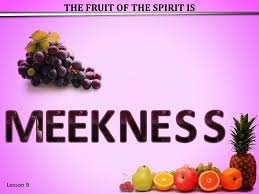Character Traits of the Spiritual Life:
Meekness
Richard Hollerman
The meaning that we commonly give to the term meekness is somewhat different from the meaning of the Greek. Our English definition for meek would be “showing patience and humility; gentle. . . . Easily imposed on; submissive.”[i][i] Often it is thought of as “weakness.”[ii][ii] The Greek adjectives would be praus or praos. The nouns would be prautes or praotes.
W. E. Vine discusses the meaning. He says that the meaning of prautes . . . is not readily expressed in English, for the terms meekness, mildness, commonly used, suggest weakness and pusillanimity to a greater or less extent, whereas prautes does nothing of the kind. Nevertheless, it is difficult to find a rendering less open to objection than “meekness”; “gentleness” has been suggested, but as prautes describes a condition of mind and heart, and as “gentleness” is appropriate rather to actions, this word is no better than that used in both English Versions. It must be clearly understood, therefore, that the meekness manifested by the Lord and commended to the believer is the fruit of power. The common assumption is that when a man is meek it is because he cannot help himself; but the Lord was “meek” because he had the infinite resources of God at His command. Described negatively, meekness is the opposite of self-assertiveness and self-interest; it is equanimity of spirit that is neither elated nor cast down, simply because it is not occupied with self at all.[iii][iii]
One suggestion for the word is that it means “strength under control.”[iv][iv] Barclay notes the usage in Classical Greek: “The words are regularly used of animals which have been tamed, and which have learned to accept discipline and control. A horse obedient to the reigns, a dog trained to obey the word of command, is praus.”[v][v] In another passage, Barclay explains: “There is gentleness in praus but behind the gentleness there is the strength of steel, for the supreme characteristic of the man who is praus is that he is the man who is under perfect control. It is not a spineless gentleness, a sentimental fondness, a passive quietism. It is a strength under control.”[vi][vi] In New Testament usage, “meekness is the aspect of humility that is manifest in a mild, longsuffering, patient disposition. Meekness is often characterized as the polar opposite of an angry personality.”[vii][vii]
Neither the Romans or the Jews valued meekness. The Romans valued pride and were often arrogant. They exalted the conquering spirit that would win over the opponent on the battlefield and exert a domination over the defeated foes. Many of the Jews were plotting revolution against the Roman occupation, especially in Galilee, where the Zealots did not value a meek attitude. The Jewish leaders also frowned on a meek spirit. “Jewish religion in that era was strongly influenced by the Pharisees’ teaching. Their example often fostered pride, self-sufficiency, hypocritical piousness, arrogance, and self-righteousness. All of that was incompatible with the notion of meekness.”[viii][viii]
The Lord Jesus is our example in this quality as in others. Jesus invited, “Come to Me, all who are weary and heavy-laden, and I will give you rest. Take My yoke upon you and learn from Me, for I am gentle and humble in heart, and you will find rest for your souls. For My yoke is easy and My burden is light” (Matthew 11:28-30). The term “gentle” here is praus in the Greek, our word for “meek” (as found in the KJV). Paul also refers to “the meekness and gentleness of Christ” (2 Corinthians 10:1). Christ could be described in this way: “[He] committed no sin, nor was any deceit found in His mouth; and while being reviled, He did not revile in return; while suffering, He uttered no threats, but kept entrusting Himself to Him who judges righteously” (1 Peter 2:22-23).
Many men in this situation would indeed have reviled others when they would revile and would utter threats when suffering unjustly, but Jesus remained calm, controlled, and without retaliation—the very essence of meekness. It has been said, “Anger is the signal that we need to check the quality of our meekness.”[ix][ix] Not only this, but “when we are meek, we will not be concerned about having the first word or the last word.”[x][x]
As Christians, we are to manifest meekness as one of the qualities that best displays our walk with the Lord. Jesus gives His Beatitudes, and the third one reads, “Blessed are the meek, for they shall inherit the earth” (Matthew 5:5, ESV). We must have this “strength under control” if we would inherit the new heavens and the new earth (2 Peter 3:13; Revelation 21:1-2). Peter encourages the Christian wife to properly relate to her husband, saying that the spouse should “observe your chaste and respectful behavior,” then he urges the wife, “let it be the hidden person of the heart, with the imperishable quality of a gentle and quiet spirit, which is precious in the sight of God” (1 Peter 3:2, 4). The term “gentle” here is praeos, “meek.” God finds the wife’s “meek” spirit to be precious, and this inner heart disposition may have a pronounced effect on the observing husband. As Shakespeare put it, “Her voice was ever soft, gentle and low, an excellent thing in women.”[xi][xi]
Our relation to other people should be characterized by this spirit of meekness, this inner strength that is under control. Paul wanted Timothy to manifest this attitude when he spoke with opponents: “The Lord’s bond-servant must not be quarrelsome, but be kind to all, able to teach, patient when wronged, with gentleness [prauteti] correcting those who are in opposition” (2 Timothy 2:24-25). Even in the midst of an intense confrontation, the Lord’s servant must be meek, for if he manifests a selfish anger, he fails in communication. We are to relate to one another with humility, gentleness or meekness [prautetos], patience, tolerance and love (Ephesians 4:2). Our attitude as we approach the Scriptures to seek God’s will must be one of “meekness.” James commands, “Put away all filthiness and rampant wickedness and receive with meekness the implanted word, which is able to save your souls” (1:21).
We are to be clothed as a garment with “compassionate hearts, kindness, humility, meekness, and patience” (Colossians 3:12, ESV). Paul instructs Titus to teach others to be meek (Titus 3:2).[xii][xii] The apostle contrasts meekness with an attitude of punishment and couples it with love at 1 Corinthians 4:21. Paul instructs us to use meekness as we correct a sinful brother: “Brethren, even if anyone is caught in any trespass, you who are spiritual restore such a one in a spirit of gentleness [prautetos]; each one looking to yourself, so that you too will not be tempted” (Galatians 6:1). In such conditions, the restorer must have a gentleness but it must have a strength that is under control. Peter also tells us how to respond to the unbeliever who asks us about our hope: “Sanctify Christ as Lord in your hearts, always being ready to make a defense to everyone who asks you to give an account for the hope that is in you, yet with gentleness [prautetos] and reverence” (1 Peter 3:15). Strength under control is what is needed in our response.
“Meekness” is related to other virtues and sometimes it is difficult to translate consistently. Barclay even thinks it is related closely with “self-control” and is to be manifested in various ways:
The root meaning of prautes is self-control. It is the complete control of the passionate part of our nature. It is when we have prautes that we treat all men with perfect courtesy, that we can rebuke without rancor, that we can argue without intolerance, that we can face the truth without resentment, that we can be angry and yet sin not, that we can be gentle and yet not weak. Prautes is the virtue in which our relationships both with ourselves and our fellow-men become perfect and complete.[xiii][xiii]
[i][i] The American Heritage College Dictionary.
[ii][ii] “In modern thought and language meekness is not an admirable quality. The word has in it nowadays suggestion of spinelessness and spiritlessness, and a lack of strength and virility. The only real alternative which the modern translations offer is gentleness, which is better, but which is by no means a perfect translation” (Barclay, Flesh and Spirit, pp. 111-112).
[iii][iii] W. E. Vine, Expository Dictionary.
[iv][iv] MacArthur, The Quest for Character, p. 23.
[v][v] Flesh and Spirit, pp. 113-114.
[vi][vi] New Testament Words, pp. 241-242.
[vii][vii] MacArthur, The Quest for Character, p. 23.
[viii][viii] Ibid., p. 24.
[ix][ix] The Power for True Success, p. 133.
[x][x] Ibid.
[xi][xi] Quoted by Barclay, Flesh and Spirit, p. 114.
[xii][xii] Schwandt and Collins, The English-Greek Reverse Interlinear New Testament renders this “courtesy.”
[xiii][xiii] William Barclay, Flesh and Spirit, p. 121.








 You can reach us via e-mail
at the following address:
You can reach us via e-mail
at the following address: